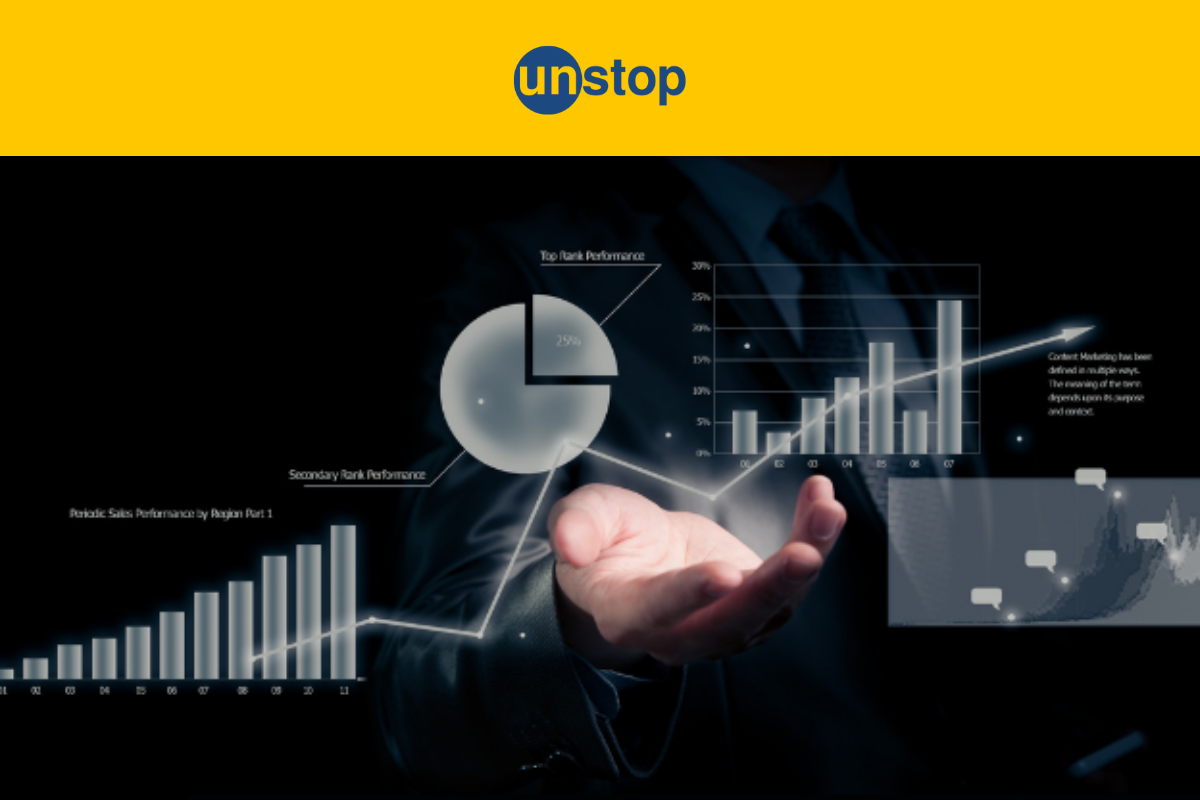- What is MBA in Business Analytics: Admission and Eligibility Criteria
- Difference Between Business Analytics and Data Science
- List of Top MBA in Business Analytics Colleges in India
- Career Opportunities with a Business Analytics MBA
- Potential Job Roles for MBA in Business Analytics Graduates
- MBA in Business Analytics Salary in India: Trends & Factors
- MS in Business Analytics vs MBA in Business Analytics: Which is Better?
- Benefits and Future Scope of MBA in Business Analytics
- FAQs
MBA In Business Analytics: Course Details, Eligibility, Future Scope

In today's data-driven world, the importance of business analytics cannot be overstated. The ability to analyze and interpret vast amounts of data is crucial for making informed business decisions and gaining a competitive edge. That's where an MBA in Business Analytics comes into play.
So, what is MBA in Business Analytics (BA)? MBA in BA equips individuals with the skills and knowledge needed to navigate the complex landscape of data analysis and make strategic business decisions based on insights derived from statistical analysis, big data, and advanced analytics techniques. This 2-year program offers a comprehensive curriculum that covers topics such as business intelligence, data science, and business administration.
The demand for professionals with expertise in business analytics is rapidly growing across industries. Companies recognize the value of leveraging data to drive innovation, optimize operations, and identify new opportunities.
By pursuing an MBA in Business Analytics, individuals can enhance their career prospects by becoming well-versed in this critical field. In this article, we will explore the various aspects of an MBA Business Analytics.
Looking for a Business Analyst job? Check out these vacancies at top firms!
What is MBA in Business Analytics: Admission and Eligibility Criteria
To pursue a full time MBA in Business Analytics, there are certain eligibility requirements and admission criteria that prospective students should be aware of. Different colleges and universities may have specific criteria for admission to this program. Here is a brief discussion on the topic:
General Eligibility Requirements
-
Before applying for an MBA in Business Analytics, it is important to meet the general eligibility requirements set by institutions offering this course.
-
These requirements typically include having a bachelor's degree from a recognized university or college.
- Some institutions may also consider work experience and academic background during the selection process.
Specific Admission Criteria
-
Various colleges and universities have their own specific admission criteria for the MBA Business Analytics program. These criteria may include minimum GPA requirements, prerequisite courses, or even interviews as part of the application process.
-
It is advisable to carefully review the admission guidelines provided by each institution to ensure compliance with their requirements.
Entrance Exams
-
Many institutions offering an MBA in Business Analytics require applicants to take entrance exams as part of the admission process.
-
Commonly accepted entrance exams for this program include the GMAT (Graduate Management Admission Test) or GRE (Graduate Record Examination).
-
These exams assess students' aptitude in areas such as quantitative reasoning, verbal reasoning, analytical writing, and critical thinking skills.
Work Experience and Academic Background
-
When considering applicants for an MBA Business Analytics course, many institutions may place emphasis on work experience and academic background (i.e., a degree in statistics, mathematics, etc.).
-
Relevant professional experience can demonstrate practical knowledge in the field, while a strong academic record showcases intellectual capabilities. However, this in no way cancels the chances of freshers or candidates with unrelated academic backgrounds for admission into this program.
Scholarship for MBA in Business Analytics
Scholarships for MBA programs in Business Analytics in India can be a great way to offset the cost of education and make pursuing your MBA more affordable. The scholarship amount offered by universities, government organizations, private companies, and nonprofit foundations varies depending on various factors. Here are some scholarship opportunities you can explore:
Government Scholarships
The Ministry of Minority Affairs in India offers scholarships for minority students pursuing professional courses, including MBA programs. These scholarships enable candidates from minority communities to pay the program fee.
University Scholarships
Many universities in India offer merit-based scholarships to MBA students who have exceptional academic records. These scholarships are often awarded based on the MBA entrance exam scores or previous academic achievements.
Private/Corporate Scholarships
Many private companies grant scholarships to deserving candidates. For example, the Aditya Birla Group offers scholarships to students pursuing their MBA at select top B-schools in India, including those specializing in Business Analytics.
TCS offers scholarships to MBA students specializing in Business Analytics. These scholarships are typically awarded to students who meet certain criteria and demonstrate a strong interest in analytics.
Nonprofit Foundations
Some nonprofit foundations and organizations offer scholarships to students pursuing MBA programs. These scholarships may be specific to certain fields of study, including Business Analytics.
Also Read: Best scholarships for MBA students of India
Difference Between Business Analytics and Data Science
Business analytics and data science are two distinct fields that are often used interchangeably, but they have significant differences in terms of their focus, scope, and application. While both fields involve the analysis of data to derive insights and make informed decisions, they have distinct approaches and objectives.
Business analytics primarily focuses on using data to solve specific business problems and make data-driven decisions. It involves the use of statistical techniques and tools to analyze historical data and identify trends, patterns, and correlations.
The main goal of business analytics is to provide actionable insights that can drive business growth, optimize operations, and improve decision-making. It often involves analyzing structured data from various sources, such as sales data, customer data, and financial data.
On the other hand, data science is a broader field that encompasses various disciplines, including statistics, mathematics, computer science, and domain knowledge. Data scientists focus on the entire data lifecycle, from data collection and cleaning to analysis and visualization.
Data science involves using advanced algorithms and machine learning techniques to extract insights from large and complex datasets. The main objective of data science is to uncover hidden patterns and relationships in data, develop predictive models, and create data-driven solutions to complex problems.
Business analytics is more focused on specific business domains and industries in terms of scope. It often involves working closely with stakeholders to understand their needs and requirements and develop customized analytical solutions. Data science, on the other hand, has a broader scope and can be applied to various domains, including healthcare, finance, marketing, and social sciences.
In terms of application, business analytics is often used to solve specific business problems, such as improving marketing campaigns, optimizing supply chain operations, or reducing customer churn. Data science, on the other hand, is used for more complex and open-ended problems, such as developing recommendation systems, predicting customer behavior, or analyzing social media sentiment.
List of Top MBA in Business Analytics Colleges in India
Here are some top universities/ institutes offering an MBA in Business Analytics across India:
-
NMIMS School of Business Management
-
Indian School of Business (ISB)
-
Indian Institute of Management (IIM) Bangalore
-
Xavier School of Management (XLRI)
-
SP Jain Institute of Management and Research
-
Great Lakes Institute of Management
The above-mentioned colleges/universities have garnered recognition for their excellence in providing an MBA in Business Analytics education:
-
NMIMS School of Business Management: Ranked among the top B-schools by various prestigious ranking agencies.
-
ISB: Consistently ranked as one of the best B-schools globally for its management programs, including business analytics.
-
IIM Bangalore: Recognized as one of the premier management institutes worldwide, known for its rigorous academic standards.
-
XLRI: Highly regarded for its management programs, securing top positions in national and international rankings.
-
SP Jain Institute of Management and Research: Accredited by the Association of MBAs (AMBA) and consistently ranked among the top B-schools in India.
-
Great Lakes Institute of Management: Recognized for its focus on analytics education and ranked among the best B-schools in India.
Career Opportunities with a Business Analytics MBA
Professionals with a business analytics major are in high demand across various industries. Organizations rely on data analysis to drive their decision-making processes, making individuals with expertise in business analytics invaluable assets. Pursuing an MBA in Business Analytics opens up a world of career opportunities.

The versatility of business analytics skills extends beyond specific sectors. Professionals trained in this field can find rewarding careers across industries such as finance, healthcare, technology, and retail. The ability to extract meaningful insights from data is highly sought after by employers looking to gain a competitive edge.
In finance, professionals with a business analytics background play crucial roles in risk assessment and portfolio management. Healthcare organizations rely on data analysis to improve patient care outcomes and operational efficiency.
Technology companies leverage business analytics to enhance product development and customer experience. Retailers utilize data-driven insights to optimize inventory management and personalize marketing strategies.
A career in business analytics offers the opportunity to make a tangible impact on organizational success through informed decision-making. With an MBA in Business Analytics, professionals possess the skills necessary to navigate the ever-evolving landscape of big data and contribute meaningfully to their chosen industry.
By combining strong analytical abilities with strategic thinking, individuals equipped with a business analytics major can unlock numerous doors in today's job market. As organizations continue to recognize the value of leveraging data for growth and innovation, career prospects for those specializing in business analytics remain promising.
Remember that pursuing an MBA in Business Analytics can lead you towards exciting career paths across diverse industries where your skills will be highly valued.
Potential Job Roles for MBA in Business Analytics Graduates
After completing an MBA in Business Analytics, graduates have a wide range of job opportunities available to them. These roles require specific skill sets and offer promising career progression paths. Here are some examples of potential job roles for MBA graduates specializing in business analytics:
-
Business Analyst
-
Responsibilities: Analyzing complex data sets, developing statistical models, and creating algorithms to extract insights for business growth.
-
Required Skill Sets: Proficiency in programming languages like Python or R, strong analytical thinking, and data visualization skills.
-
Career Progression: Business Analyst, Senior Business Analyst, Analytics Consultant.
-
-
Financial Analyst
-
Responsibilities: Conducting financial analysis, forecasting market trends, and providing recommendations for investment decisions.
-
Required Skill Sets: Strong knowledge of financial principles and tools such as Excel, ability to interpret financial statements, and perform risk assessments.
-
Career Progression: Senior Financial Analyst, Finance Manager.
-
-
Operations Research Analyst
-
Responsibilities: Using mathematical models to optimize business operations and solve complex problems related to logistics or supply chain management.
-
Required Skill Sets: Proficiency in mathematical modeling techniques, data analysis software (e.g., MATLAB), and critical thinking abilities.
-
Career Progression: Senior Operations Research Analyst, Operations Manager.
-
These are just a few examples of the diverse job roles available for MBA graduates specializing in business analytics. Other positions that align with this degree include:
-
Quantitative Analyst
- Marketing Analyst
Top recruiters actively seek professionals with an MBA in Business Analytics due to the increasing demand for skilled analysts across various industries.
MBA in Business Analytics Salary in India: Trends & Factors
Professionals with an MBA in Business Analytics can expect attractive salary ranges that are influenced by various factors. These factors include experience, industry, and job role. Here are some key points to consider regarding the average salary prospects for individuals specializing in this field:
-
Salary Ranges: Professionals with an MBA in Business Analytics typically enjoy competitive salary packages. The range varies depending on several factors, but it is generally higher compared to other business-related roles. Generally, for candidates with MBA in Business Analytics salary ranges from INR 6 LPA to INR 30 LPA approximately.
-
Factors Influencing Salaries: Experience plays a significant role in determining the salary offered to MBA holders in Business Analytics. Those with more years of experience tend to command higher salaries. The industry and job role also impact compensation levels.
-
Notable Trends and Statistics: The field of business analytics has witnessed remarkable growth, leading to increased demand for professionals skilled in this area. As a result, there has been a positive trend in salary growth for individuals with an MBA in Business Analytics.
-
Higher Earning Potential: Compared to other business-related roles, professionals specializing in business analytics have the potential for higher earning potential due to their expertise and ability to leverage data-driven insights effectively.
By acquiring advanced analytical skills through an MBA program focused on business analytics, professionals position themselves well for rewarding careers accompanied by competitive compensation packages. Remember that salaries will depend on individual circumstances and market conditions; however, obtaining an MBA specialized in Business Analytics can significantly enhance one's earning potential.
MS in Business Analytics vs MBA in Business Analytics: Which is Better?
When considering a career in the field of business analytics, individuals often have to decide between pursuing a Master's degree (MS) in Business Analytics or a Master's in Business Administration (MBA) with a specialization in Business Analytics. Both options have their own advantages, and it ultimately depends on the individual's career goals and aspirations.
An MBA in Business Analytics offers a unique combination of business knowledge and analytical skills. This degree equips individuals with a deep understanding of business principles and strategies while also providing them with the technical skills needed to analyze and interpret data.
This combination of business acumen and analytical expertise is highly valued in the industry, as it allows professionals to not only identify patterns and trends in data but also make strategic decisions based on these insights.
Furthermore, an MBA in Business Analytics provides individuals with a broader skill set and knowledge base compared to a specialized MS degree. This versatility allows graduates to pursue a wide range of career opportunities in various industries, such as consulting, finance, marketing, and operations management.
In terms of future scope, the demand for professionals with expertise in business analytics is rapidly growing. Organizations across industries are increasingly relying on data-driven insights to make informed decisions and gain a competitive edge. As a result, there is a high demand for business analytics professionals who can effectively analyze and interpret data to drive strategic decision-making.
Overall, both an MS in Business Analytics and an MBA in Business Analytics offer unique benefits and future scope. The choice between the two ultimately depends on the individual's career goals and aspirations. Those seeking a more specialized technical role may prefer an MS degree, while individuals looking for a broader skill set and career opportunities may opt for an MBA.
Benefits and Future Scope of MBA in Business Analytics
In conclusion, pursuing an MBA in Business Analytics offers numerous benefits and promising future prospects. The program equips students with a strong foundation in both business management and data analytics, making them highly sought-after professionals in today's data-driven world.
Graduates can expect to find lucrative career opportunities across various industries, including finance, consulting, healthcare, and technology. With the increasing demand for skilled business analytics professionals, individuals with an MBA in Business Analytics can enjoy competitive salaries and excellent growth potential.
The combination of business acumen and analytical skills enables graduates to make informed decisions based on data insights, contributing to organizational success. Moreover, the field of business analytics is constantly evolving, offering continuous learning opportunities and the chance to stay at the forefront of technological advancements.
If you are interested in leveraging your analytical abilities to drive strategic decision-making and shape the future of businesses, pursuing an MBA in Business Analytics course is a wise choice. Take the next step towards a rewarding career by exploring top colleges offering this program and assessing their admission criteria. Start your journey towards becoming a proficient business analytics professional who can unlock valuable insights from complex data sets.
FAQs
1. What are the prerequisites for pursuing an MBA in Business Analytics?
To pursue an MBA in Business Analytics, most colleges require candidates to have a bachelor's degree from a recognized university. Some institutions may also consider work experience or prior knowledge in subjects like mathematics or statistics as advantageous.
2. What job roles can I expect after completing an MBA in Business Analytics?
Upon completing an MBA in Business Analytics, graduates can explore various job roles such as Data Analyst, Business Intelligence Manager, Data Scientist, Marketing Analyst, Operations Analyst, or Financial Analyst.
3. Are there any specific industries that prefer hiring professionals with an MBA in Business Analytics?
Professionals with an MBA in Business Analytics are highly valued across multiple industries, including finance, consulting, healthcare, technology, e-commerce, and retail.
4. What is the average salary for professionals with an MBA in Business Analytics?
The average salary for professionals with an MBA in Business Analytics varies depending on factors such as experience, industry, and location. However, it is not uncommon for graduates to earn competitive salaries starting from USD 70,000 per year.
5. Can I pursue an MBA in Business Analytics course through online or part-time programs?
Yes, many institutions offer online or part-time MBA programs in Business Analytics to cater to the needs of working professionals or those who prefer a flexible learning schedule. These programs provide the same curriculum and opportunities for career advancement as full-time programs.
You might also be interested in reading:
As a biotechnologist-turned-writer, I love turning complex ideas into meaningful stories that inform and inspire. Outside of writing, I enjoy cooking, reading, and travelling, each giving me fresh perspectives and inspiration for my work.
Login to continue reading
And access exclusive content, personalized recommendations, and career-boosting opportunities.
Subscribe
to our newsletter















Comments
Add comment